PENGUIN  CLASSICS
CLASSICS
THE NINETY-FIVE THESES AND OTHER WRITINGS
MARTIN LUTHER (14831546), Christian professor and pastor at the University of Wittenberg (Saxony, Germany), lived and worked during an epoch of tumultuous social, political, and religious turmoilthe fall of late medieval Christendom and the rise of the modern West. In the early sixteenth century, he identified key features of the biblical messagepreeminently the gospel of salvation focused on Jesus Christ. However, when he proposed that the Roman Catholic Church reform its teaching and practice to emphasize this message, the papacy rejected his interpretations as hereticalexcommunicating him and his followers as Lutherans. The controversy surrounding Luther prompted various protest movements throughout Europe to express their grievancesoften differing radically from Luthers reformand contributing to the upheaval of the age and what became known as the Protestant Reformation(s).
WILLIAM R. RUSSELL, pastor and scholar, serves Augustana Lutheran Church, Minneapolis, Minnesota, where he investigates the life and work of Martin Luther. With a Ph.D. from the University of Iowa and an M.Div. from Luther Seminary, Russell has authored/edited eight books and dozens of articles. A sought-after speaker, he has addressed audiences from Canada to Brazil, Malaysia to Puerto Rico, Oslo to Cape Town. He currently serves as president of the American Academy of Religion, Upper Midwest Region. Married to Ann Svennungsen, he has three grown children and two grandchildren.
PENGUIN BOOKS
An imprint of Penguin Random House LLC
375 Hudson Street
New York, New York 10014
penguin.com
Translation, preface, introduction, and selection copyright 2017 by William R. Russell
Penguin supports copyright. Copyright fuels creativity, encourages diverse voices, promotes free speech, and creates a vibrant culture. Thank you for buying an authorized edition of this book and for complying with copyright laws by not reproducing, scanning, or distributing any part of it in any form without permission. You are supporting writers and allowing Penguin to continue to publish books for every reader.
Ebook ISBN: 9780698187931
Library of Congress Cataloging-in-Publication Data
Names: Luther, Martin, 14831546, author. | Russell, William R., 1954 translator, editor. | Luther, Martin, 14831546. Disputatio pro declaratione virtutis indulgentiarum. English.
Title: The Ninety-five theses and other writings / Martin Luther ; translated and edited with an introduction by William R. Russell.
Description: New York : Penguin Books, 2017. | Includes bibliographical references.
Identifiers: LCCN 2017021273 | ISBN 9780143107583 (paperback)
Subjects: LCSH: TheologyEarly works to 1800. | BISAC: RELIGION / Christianity / History. | RELIGION / Christianity / Lutheran. | HISTORY / Europe / Western.
Classification: LCC BR331 .E5 2017c | DDC 230/.41dc23 LC record available at https://lccn.loc.gov/2017021273
Cover art: Steven Tabbutt
Version_1
For Mary Elizabeth Russell Koslig
Contents
Preface
When I stepped into the work on this book in the summer of 2012, I welcomed the expected set of moves it would providea steadying pace from home to office to library. A dance of sorts, with a rhythm I knew well. I could use some of thata little predictability with a normal tempo. John, our twenty-eight-year-old son, had been diagnosed with leukemia the previous fall. His illness had floored us and we were struggling to regain our footing. We stumbled through those early, chaotic months of his chemo and crises, but were beginning to stand againstaggering toward a world of realistic expectations. Johns Down syndrome had complicated his treatment. It also helped him, characteristically, to find his own way. His oncologists, a group not known for irrational exuberance, would pronounce him cured in June 2014.
The expected then twisted into the unimaginable. By January 2015, Johns leukemia had returnedwith no medical cure in sight. Recurrence for him meant death. We staggered with him as we tried to help him die well. On the morning of May 2, he convulsed a bit and his beautiful heart stopped. He seemed scared, even with his dear sister at his right side and his strong mom at his left. They spoke soft words of encouragement; whispered a Bible camp song into his ears. I cradled his bony legs and prayed. Johns earthly dance was over.
As we made our way in that darkness, so many partners supported us. In those years and since, church, family, and friends, physicians, nurses, and therapists have held us upright and helped us put one foot in front of the other. Support beyond measure for a loss beyond calculation. In Johns last months with us, however, one companion surprised me: Martin Luther. Perhaps he shouldnt have. Ive been studying Luther closely for thirty-five years. I know the Luther canon. I know his public, earth-shaking, epoch-defining deeds. And because of the way he lived and the kinds of writings he left us, I know he encountered grief and despairoffering pastoral care to others and struggling with his own limitations and losses.
I admit that during this work, I wasnt always looking at Luther for support and wisdom, I was looking at his grammar and syntax. I welcomed the breaks from the sacred work of accompanying Johntranslating, contextualizing, interpreting a passage could take me away from the painful and chaotic dizziness of it all. After such respites, I could better reposition myself next to John (as well as my wife and daughters). That alone would have been helpful enough.
The Reformer, though, would not stay a purely intellectual pursuit. No mere distraction or object of historical curiosity, the sixteenth-century Luther led me toward comfort and strength while giving voice to my pain and weakness. His five-hundred-year-old words and profound insights began to touch me deeply. He exemplifies the truth of poet-philosopher David Whytes claim that the past is never just the past.
Despite (or, perhaps, because of) eyes blurred with grief, I saw in a new way how the Reformer moved amid the epic changes in his world. I could see him improvise through his own dizzying chaos and buckle under loads he did not choose and could not carry; how he leaned on others amid his darkest of struggles. My perspective revealed aspects of Luther I hadnt seen beforespecifically, how he tended to his core insight, The First and Chief Article. I saw how, through it all, he wanted his life and work to express authentically what hed learned about God and humanity, life and death, law and gospel. The profound encouragement and strength all of that provided, I must admit, surprised me.
My family, in different ways, continues to surprise me. For all those surprises, great and small, I would simply say thanks to: Ann, John (of blessed memory), daughters Sarah and Mary, sons-in-law Dan and Geoff, grandkids John and Annika. The incalculable ways you find to love and care for one another (including me) and so many others are wonderfulloving, laughing, learning, believing, serving with you is a blessing indeed. Thank you, dear ones.
Im grateful also for trusted friends and colleagues, some for their professional expertise, some for their personal support: Carolyn Carlson (senior Penguin editor who first approached me with this project), Brice Eichlersmith (profound at praying), Tom Greenspon (weaver of wisdom), Robert Kolb (amiable dean of U.S. Luther researchers), Jack Leveille (Renaissance handball player), Rick Lischer (too young to be retired), Leipzigers Johannes Markert and Helge Voigt (who made this an international project), Jim May (Latinist extraordinaire), Paul Rogers (encourager and Germanophile), John Roth (bishop-scholar of the ELCA), Elda Rotor (patient vice president and publisher, Penguin Classics), Phil Ruge-Jones (Heidelberg Disputation expert), Pamela Stalheim Lane (esteemed pastoral colleague), Gary Simpson (longtime theological conversation partner), Eric Trozzo (interpreter of Luther in Southeast Asia), Tim Wengert (wise Luther wonk), and Steve and Mary Wilkins Peterson (generous providers of friendship and welcome).

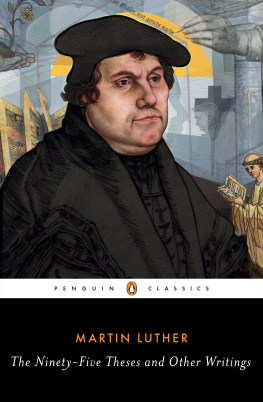
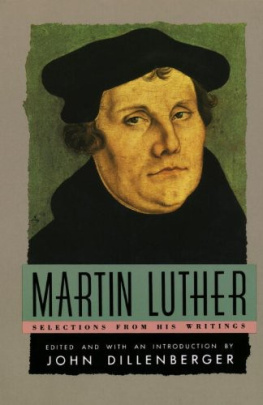
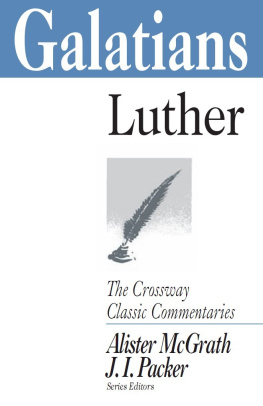
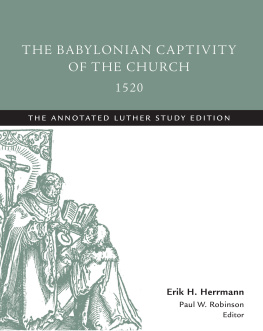
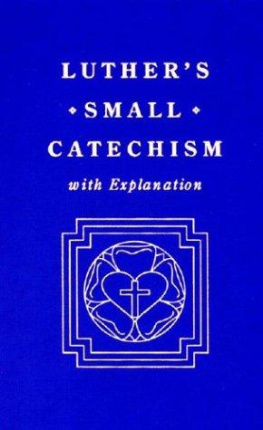
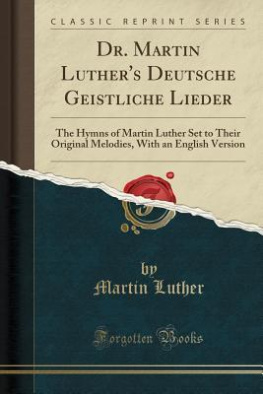

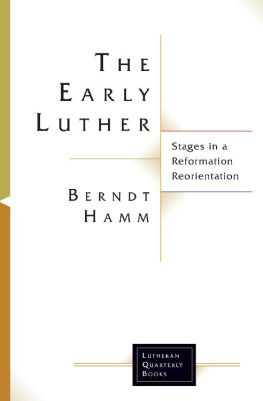
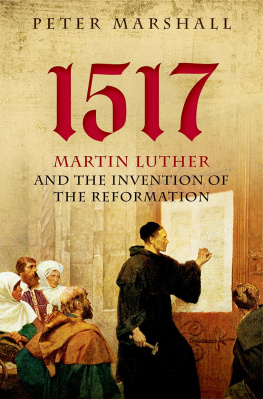
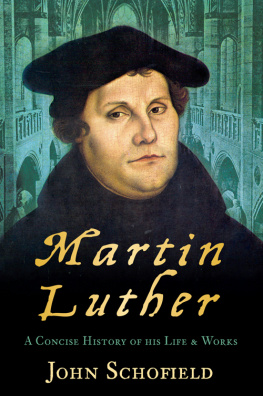
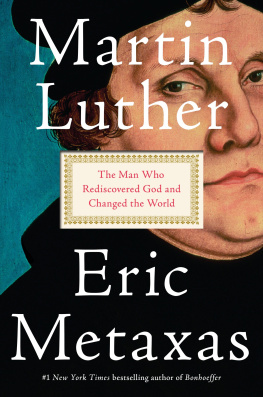
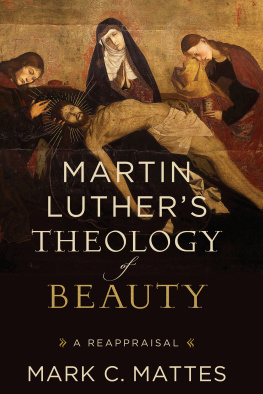
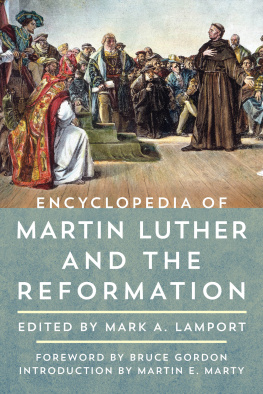
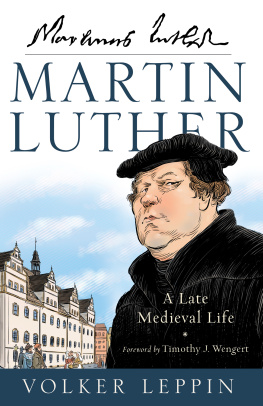


 CLASSICS
CLASSICS